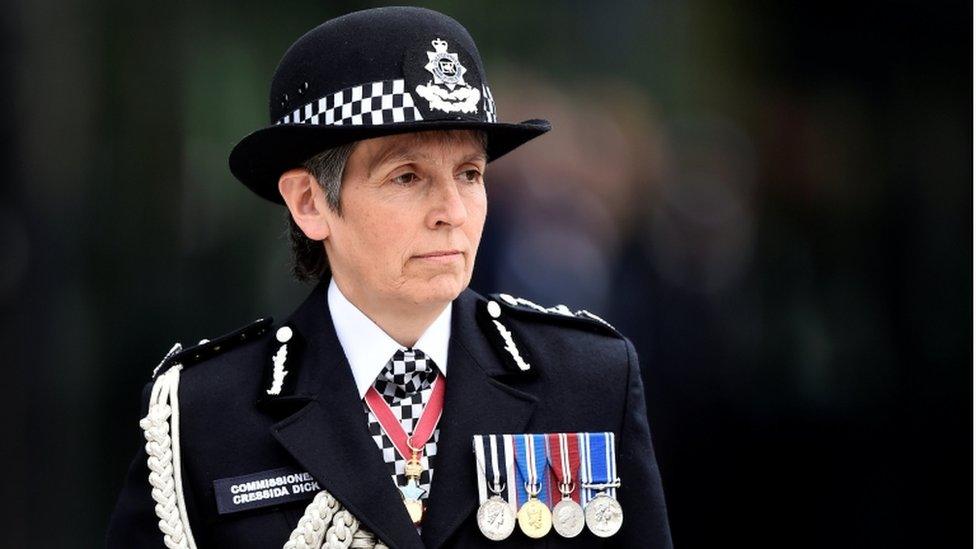Crime solving rates 'woefully low', Met Police Commissioner says
- Published
- comments

Too many crimes are being left unsolved, the Metropolitan Police Commissioner has said.
During a speech about the future of policing in England and Wales, Cressida Dick admitted that national detection rates for some offences were "woefully low".
"The courts are emptying, not filling," she said, adding "It's not good and I'm not proud of it."
She said sifting through vast amounts of phone and computer data is partly to blame as it slows down investigations.
She is calling for investment in resources, technology and expertise to drive up clear-up rates.
During the speech at the annual John Harris lecture for the Police Foundation - an independent think-tank - Ms Dick contrasted the state of policing now with the service 36 years ago, when she joined the Met.
She said: "We are, in my view, infinitely more accountable and trustworthy, less secretive, less, frankly, arrogant, more humble, more responsive and of course very much, but not enough, more diverse."
But the commissioner said criminal investigations in the 1980s were generally "straightforward" and could be completed quickly, with suspects often charged within 24 hours, whereas inquiries now were more complex, involving a large amount of digital evidence.
"There is so much data that has to be looked at... and you've got to know your data inside out and back to front," she said.
Ms Dick, who became commissioner in April 2017, linked the growing digital demands on policing with a fall in the number of crimes that are solved.
Home Office figures show that in England and Wales last year only 8.2% of crimes recorded by police resulted in a suspect being charged or summonsed to appear in court, the lowest level since 2015 when a new method of counting detections was introduced.
For some individual crimes, clear-up rates were even lower: 3.8% for sexual offences; 5.4% criminal damage and arson; 6% theft.
"Overall police detection rates nationally are low, woefully low I would say in some instances, and the courts are emptying, not filling," the Commissioner said.
"It's not good, and I'm not proud of it," she added.
The Home Office statistics suggest there is a range of reasons why fewer prosecutions are being brought.
In 45.7% of offences, no suspect was identified. Over one-in-five of cases failed to proceed because the victim did not co-operate, and in almost one in 10, there were other problems with evidence.
Ms Dick claimed if police were able to harness data more effectively, a "very, very large proportion" of crimes could be solved, pointing to cases of murder and manslaughter to illustrate how it could be achieved.
The homicide detection rate has historically been around 90%, although BBC analysis shows it's been on the decline in London since 2016.
To raise clear-up levels to those of homicide cases, the Commissioner said it would need a "magic wand" of extra resources, better use of technology and greater expertise.